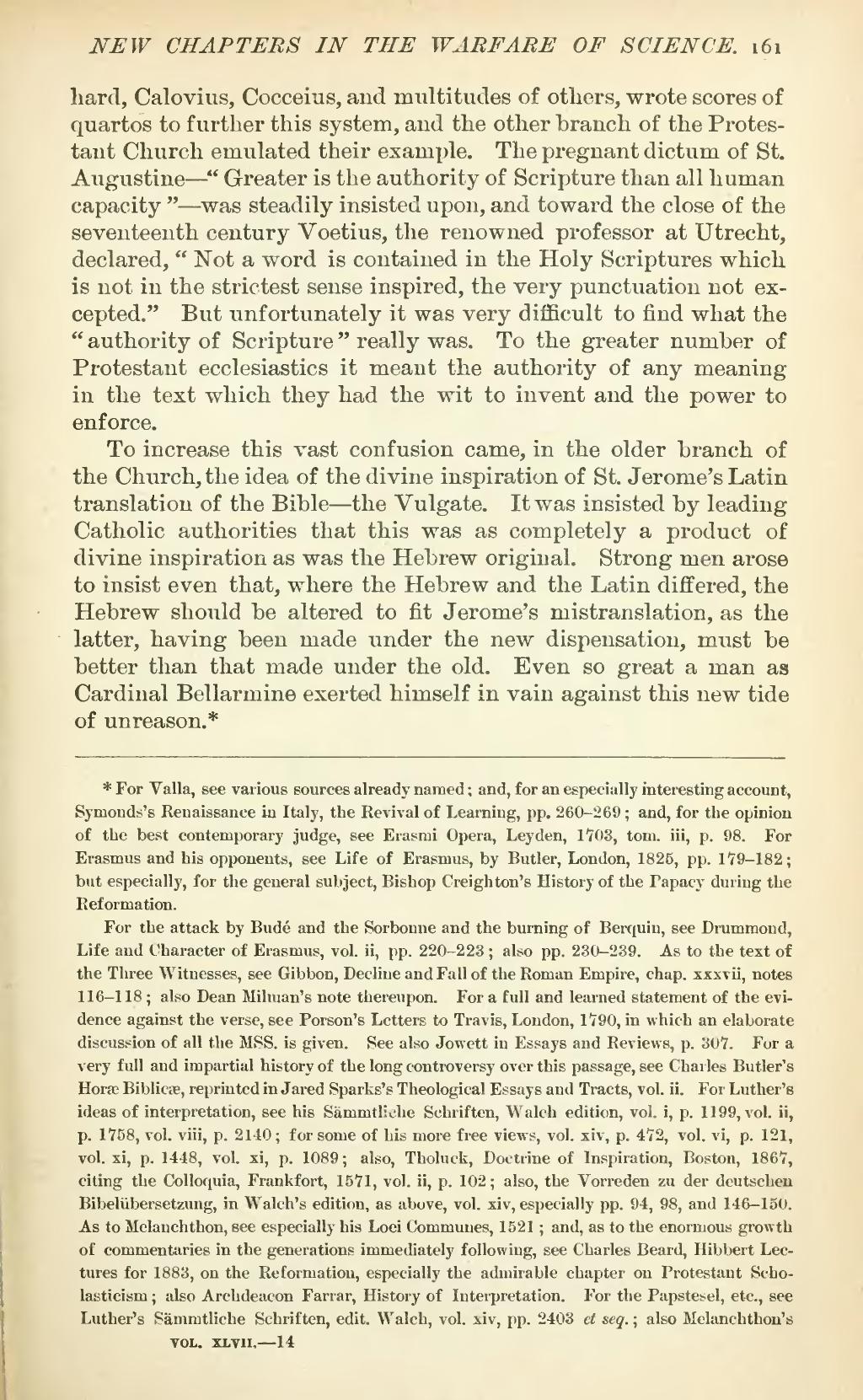hard, Calovius, Cocceius, and multitudes of others, wrote scores of quartos to further this system, and the other branch of the Protestant Church emulated their example. The pregnant dictum of St. Augustine—"Greater is the authority of Scripture than all human capacity" was steadily insisted upon, and toward the close of the seventeenth century Voetius, the renowned professor at Utrecht, declared, "Not a word is contained in the Holy Scriptures which is not in the strictest sense inspired, the very punctuation not excepted." But unfortunately it was very difficult to find what the "authority of Scripture" really was. To the greater number of Protestant ecclesiastics it meant the authority of any meaning in the text which they had the wit to invent and the power to enforce.
To increase this vast confusion came, in the older branch of the Church, the idea of the divine inspiration of St. Jerome's Latin translation of the Bible the—Vulgate. It was insisted by leading Catholic authorities that this was as completely a product of divine inspiration as was the Hebrew original. Strong men arose to insist even that, where the Hebrew and the Latin differed, the Hebrew should be altered to fit Jerome's mistranslation, as the latter, having been made under the new dispensation, must be better than that made under the old. Even so great a man as Cardinal Bellarmine exerted himself in vain against this new tide of unreason.[1]
- ↑ For Valla, see various sources already named; and, for an especially interesting account, Symonds's Renaissance in Italy, the Revival of Learning, pp. 260-269; and, for the opinion of the best contemporary judge, see Erasmi Opera, Leyden, 1703, torn, iii, p. 98. For Erasmus and his opponents, see Life of Erasmus, by Butler, London, 1825, pp. 179-182; but especially, for the general subject, Bishop Creighton's History of the Papacy during the Reformation.
For the attack by Budé and the Sorbonne and the burning of Berquin, see Drummond, Life and Character of Erasmus, vol. ii, pp. 220-223; also pp. 230-239. As to the text of the Three Witnesses, see Gibbon, Decline and Fall of the Roman Empire, chap, xxxvii, notes 116-118; also Dean Milman's note thereupon. For a full and learned statement of the evidence against the verse, see Porson's Letters to Travis, London, 1790, in which an elaborate discussion of all the MSS. is given. See also Jowett in Essays and Reviews, p. 307. For a very full and impartial history of the long controversy over this passage, see Charles Butler's Horse Biblicæ, reprinted in Jared Spafks's Theological Essays and Tracts, vol. ii. For Luther's ideas of interpretation, see his Sämmtliche Schriften, Walch edition, vol. i, p. 1199, vol. ii, p. 1758, vol. viii, p. 2140; for some of his more free views, vol. xiv, p. 472, vol. vi, p. 121, vol. xi, p. 1448, vol. xi, p. 1089; also, Tholuck, Doctrine of Inspiration, Boston, 1867, citing the Colloquia, Frankfort, 1571, vol. ii, p. 102; also, the Vorreden zu der deutschen Bibelubersetzung, in Walch's edition, as above, vol. xiv, especially pp. 94, 98, and 146-150. As to Melanchthon, see especially his Loci Communes, 1521; and, as to the enormous growth of commentaries in the generations immediately following, see Charles Beard, Hibbert Lectures for 1883, on the Reformation, especially the admirable chapter on Protestant Scholasticism; also Archdeacon Farrar, History of Interpretation. For the Papstesel, etc., see Luther's Sammtliche Schriften, edit. Walch, vol. xiv, pp. 2403 et seq.; also Melanchthon's
